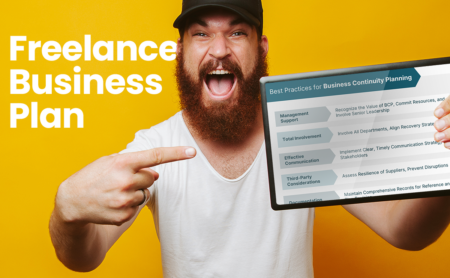Social Media is notorious for being a hotbed for overly honest confessions, offensive rants, and embarrassing photos you don’t want your employer seeing. To an extent, that’s expected for one’s personal page; it is yours to share what you want.
However, when it comes to promoting a business, everything changes.
Embarrassing photos become financially harmful, as do unpopular opinions or irrelevant speeches. Even the most innocuous sentiments can be hazardous, such as the case when LeBron James expressed frustration over his Samsung phone on Twitter, which is a brand he had been endorsing for years.

Get Weekly Freelance Gigs via Email
Enter your freelancing address and we'll send you a FREE curated list of freelance jobs in your top category every week.
When you’re representing a brand, a self-censoring filter becomes necessary to avoid any conflicts of interest.
Most entrepreneurs know that we need to keep it safe when managing our social media profile. Make no mistake – controversy can be a fantastic way to gain some publicity. But as the ever-growing list of social media casualties tallies up, maintaining standards of etiquette for your social media persona is increasingly crucial. And ultimately, if you’re able to positively promote a brand without jeopardizing your company’s reputation, then all the better.
Without further ado, here are some things you should NOT say when promoting your freelance business on social media.
Never, ever, ever…
Under no circumstances should anything degrading to a person or group/s of persons be shared on your business’ social media page. Since everybody has been raised differently and has different opinions on what language is acceptable or not, it is wise to ask yourself 3 questions:
- Am I implying anything about my customers, and if I am, can that be taken negatively?*
- Is any slang involved in this post, and if so, is it directed toward any person or a group of persons? And do I even know what this slang means?
- Is there any way at all that my post can be interpreted as prejudice toward someone?
If the answer to any of these questions implies offending people based on the terms of the question, then do not post it. You do not want to alienate anyone from your potential customer base.
*It is best to avoid implying anything about your customers. Period.
Keep your platform in mind
This may be obvious, since Twitter has a 140 character limit and Facebook has no character limit (basically). However, it’s important to think about.
Typically, a Facebook status should be personalized a little more than a tweet, because Facebook is a place where businesses can connect with individuals rather than audiences.
Tweets are more for promotional offers or letting your followers know what you are up to, while a Facebook status, which does serve the same purposes, should be a more personal way to connect with those customers who actually “like” your company.
Facebook users are far less likely to “like” a company they are less familiar with as opposed to Twitter, which is more of a soapbox platform meant to reach the masses. With Facebook, followers are much more likely to be personally affiliated and emotionally invested in your brand.
Identify your audience in each social media avenue, and cater your updates according to your audience on these respective channels.
Check your intentions
It can be tempting to share things on your business’ social media that may not have anything to do with your business, but that you find personally appealing. However, if you choose to do this, it should be relevant to what you do as a company and avoid generating controversy.
Now, you’re probably thinking to yourself, “Wait, what about that time [insert company of your choice] put up a Facebook status informing me about an important social issue in a developing country?”
Yes, sometimes that’s okay.
People like to find out what values drive your vision, so if your company is involved in philanthropy for a cause and / or if the cause directly aligns with your business interests, then go for it.

However, these posts should not spam or challenge your social media followers because they didn’t follow your page for an unrelated social cause; they followed you because they are intrigued about or supportive of your product. If you can’t say how a post you’re typing will contribute to your brand or appeal to your core followers, consider holding the backspace key for a few seconds.
Humor can be a great way to engage your followers too, making it an occasionally effective marketing tool, provided your sense of humor isn’t possibly obscene. But your goal is to keep people interested and informed about your company, so if your humor isn’t relevant or thought out with your core audience in mind, you might want to consider just sharing it with friends.
Represent yourself – nicely
Whether you’re at the ground level of a business or are the owner (or all of the above), you are representative of your company at all times. While your personal social media profile may be good for managing business relationships, you can’t be your opinionated self quite as easily once you’ve started representing your brand.
Yes, you are entitled to your own opinion, but it may be best not to share it if it could ruin your business reputation with potential clients or customers. If you do choose to post personal things which might generate any amount of controversy, be sure to limit how often you talk about those subjects and to be as respectful and coherent as you can be.
We saw the hot water Abercrombie & Fitch got themselves into when CEO Mike Jeffries made offensive statements towards overweight individuals and then issued a half-hearted apology.
We all know about the recent fiasco with DiGiorno’s use of #WhyIStayed on Twitter (a movement for domestic abuse awareness, not frozen pizzas.)
A full list of gaffes such as these would be innumerable.

So remember, even if you correct or delete an offending post, everything is permanent online.
And the damage to your brand can be just as permanent. So think before you speak, and if you don’t have anything nice to say…you know the rest.
Thoughts? Advice?
What other bits of advice would you suggest to keep a company out of controversy when it comes to social media etiquette? Is there any time when it’s acceptable to not play it safe? Comment with your experiences or thoughts.

Keep the conversation going...
Over 10,000 of us are having daily conversations over in our free Facebook group and we'd love to see you there. Join us!




Hi Robert, great article.
I recently started using Twitter and Facebook for my web design business, admittedly a little belatedly. So it was very interesting to hear your thoughts on the subject. I totally agree with what you say, I personally know people who have gotten into trouble over social media (Facebook in particular) and even lost their jobs over comments said. Having said that, I think it is very difficult to have a well constructed opinion and not offend someone. I think it is more of an inditement of the world we have created and live in today sometimes, than the actual comments Expressed.
Thanks again for the read.
Gary
GHCre8tive
Twitter has been my main social venue for a few years now. I share and over share and delete and then rethink everything and retweet. I love it.
I am starting a freelance writing and design feedback business and was thinking I should siphon that off from my main Twitter feed. But when I did some social media and web development tweets recently and tried interacting with established professionals in that field, it felt very inauthentic to me.
So I’ve decided to keep everything under one roof and just continue as me! Someone I started following on Twitter is an advocate of authentic storytelling as a meaningful part of building a brand. I can see a niche for people who keep it real and aren’t afraid to over share now and then and just move forward with their business as a real person.
There are too many mannequins and wild west faux store fronts anymore because of social media. I think people need to let their hair down now and then and show me there’s actually a real person under all that plastic.
:o))
Carla,
I really love your desire to be authentic and transparent with the business world. However I would caution – interacting with professionals like you described does not sound very inauthentic, although it may be awkward and a bit forced! Ultimately, it’s about finding a way that is real and authentic to communicate with people you don’t know in ways that will help your business. Do business, do marketing, but do it as yourself, not JUST the owner of your company!
That’s what I thought of anyways – take it or leave it!
Take care,
Robert
Robert
Oh, I really agree.
I think it depends on your line of work. Freelance writers, for example, don’t always have to tweet about grammar, SEO and how to write sizzling headlines.
Some do because that’s just their brand. But others put more out there and personalize their social media presence by being less robotic and predictable. Those are the people I tend to notice more.
When it comes to small business, I love when the people behind a business stand out more than the business itself. One of the web developers I follow writes great tutorials. But now and then he’ll share something unexpected, like a Bollywood playlist. And another one I follow is very lighthearted and down to earth, fuzzing up that line between business and a gal who really loves her work.
But over sharing can get weird and problematic. Recently a miffed developer tweeted about not being recognized for something. The language used was rather foul and this person’s attitude about it in a public forum was kind of a turn off.
The next day, though, there was some ownership of this and it ended up enduring me even more to them and their work. So on the one hand, the over share created distance and was off-putting, and on the other it came full circle and drew me in.
This is just one microcosm of online business. When a brand breaks our expectations and starts tweeting puppy photos or suddenly sharing things we don’t want to know, it can be hard earning our trust (and interest) back. I think that’s the kind of situation you were address in your post, when you cautioned people to be cautious.
Carla
You’re not going to believe this, but I actually had a puppy situation when I wrote that last sentence. No time to edit. :o)
This is a great article, full of good advice for social media beginners. Those hashtag mistakes are the proof of how a few rushed tweets can ruin your brand’s image.
Thank you! Yes, absolutely. It is so important to double check those things, and as easy to stay cautious of as it is not to.
Thanks for this article! Even though we might think this is all common sense and bears no need for repeating, we could all use a reminder now and then that our business twitter isn’t a free-for-all.
Regarding the hashtag gaffes – whoever was manning the helm could have avoided all of that backlash if they had taken a few seconds to click and see what the hashtags were about, rather than jumping on a bandwagon that had nothing to do with their companies/products. In those instances, haste did make waste.
Hi, thanks for the kind words!
Yes, agreed – it is SO important to know what you mean behind everything you say, especially when it’s a reference to something common in social media or the public eye. It was a mistake that many could make, but all could avoid.